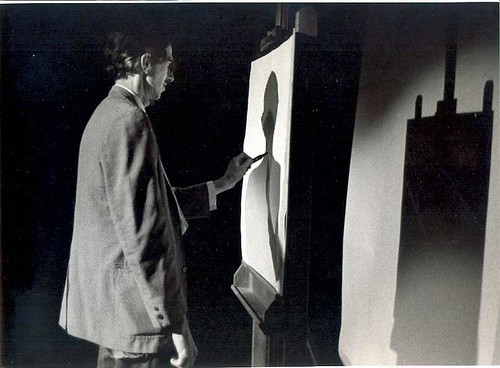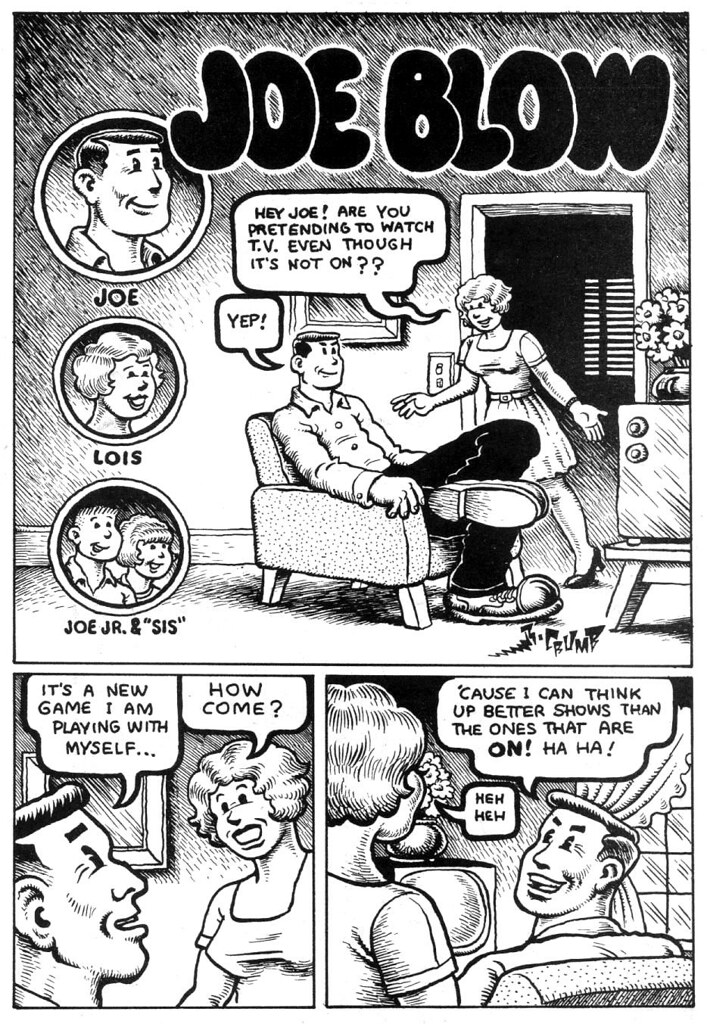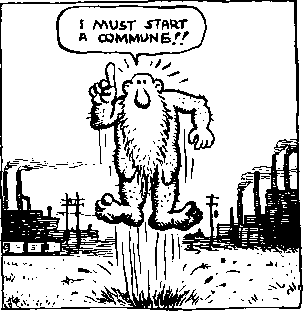 t are better off never being psychoanalyzed. His cards are laid out on the table, but not in consciously thought out duress—he’s anything but full-of-shit, but not necessarily on purpose--and his presence demands to be taken as it is—whether it’s gimpy and painful or not, which is exactly how his artwork functions as well: it would rather be like that than attempt to be something it’s not.
t are better off never being psychoanalyzed. His cards are laid out on the table, but not in consciously thought out duress—he’s anything but full-of-shit, but not necessarily on purpose--and his presence demands to be taken as it is—whether it’s gimpy and painful or not, which is exactly how his artwork functions as well: it would rather be like that than attempt to be something it’s not.Consequently Terry Zwigoff's 1994 documentary on R. Crumb and his family (Crumb) is relevant in a way that’s almost entirely regardless of his presence and impact on cartoons, graphic novels, and visual-narrative as a whole. What it says, it says on a sensitive human level that has nothing to do with his celebrity. It’s like the only really important role his fame plays is getting the film crew to his door in the first place (though he already knew the director from elsewhere--I was surprised to see that David Lynch produced this).
Indeed, I would have to go look up some dissected history of any of the fore-mentioned mediums to be able to tell you exactly what the impact he had was in the first place. But it's easy to know from a quick overview of his work and placement of its context that he did have some huge kind of lasting and important role in getting those mediums to the place their in now. That impact probably ranges from presentation to illustrative style and subject matter, and its core has to be in the point-of-view that lies behind the way Crumb delivers his narrative images as serious, realistic, and accurate representations of feelings and observations in our social reality, with no self-consciousness about the medium or content whatsoever.
He made his comics un-apologetically because he wasn't thinking of them as anything less than necessary--almost as if they weren’t “comics” at all, but just the way he managed to project his subconscious into something external, something that functioned inside of the socio-cultural setting, and that kept him from going insane while in it himself. And I'm only talking about the style and presentation of the medium he used--the filter through which everything was rendered, but it’s even truer of the content that that medium held a dialogue with. Together they contributed to building a foundation that would push comics and cartooning into a realm where they can exist as they are now--from the Watchmen to Family Guy. It’s a hard thing to pin down, and operating off of an intuitive innately human drive in the first place, it asks not to be.
Crumb’s work operates at the base of human consciousness and shouldn’t be dissected, or even given too much credit for that matter—it should be taken for what it is. And all of this is of course, especially true of his sexually explicate content that’s often taken by some as "pornographic”, whatever that means—I guess even the most sarcastic and the most poetic of erotica would be considered porn when put in “cartoon” form, especially if done so by a man.
“R.Crumb Draws the Blues” works like that: all it is, is a biography with cultural background and information that he happened to care enough about to talk about and preserve, and which would probably have been lost disjointed from history otherwise. The fact that it's a comic was extremely significant to the medium of comics at in the time-period it was made, but totally irrelevant to the thing itself and to what it’s function is. R. Crumb wasn't trying to blast open the comic-book industry and revolutionize something or other with realistic, socially pertinent, or adult material. He was just writing what he felt like in comic-form, because that's what his pen did, that's what made sense to him, it’s what let whatever it was he had coming out of him come out. The end.
What I find most interesting at the core of this perspective he has on reality is the way that everything he writes and draws, to him is very un-exaggerated. If I had seen his work with no background context and sense of this perspective I wouldn't have liked the artistic style at all. I would have taken it as cartoony and uninviting to my tastes and walked the other way before I even got to the juicy stuff. Having that background context (or taking a lot of LSD) pulls you into Crumb’s almost magical lens on reality. After watching the documentary and being made aware of that perspective behind the art, I found myself looking around New York at eccentrically shaped characters, noticing visual character ticks, ranges of steatopygia, etc. etc. and seeing how un-exaggerated many cartoon depictions actually are. Once you have that kind of lens it’s easy to see how Crumb’s representations of people are realistic to him.

The place he resides in is one where those characteristics are at the forefront of perception as opposed to the linearly organized judgments, social cues, and definitive stances in social life, two-dimensional and photographic, that we get programmed into taking by the modern western world. A sensibility of the beauty of—not just the feminine form, but of all human images—under many different apparitions and frames is crossed out of our wiring by this two-dimensionality, and replaced by cookie cutter ideals that are actually…well, not so sexy. Crumb’s take on women, though it can be a bit ominous, is refreshing. It’s as much an admittance of the colossal strength and dominance of women as it is of totally objectifying and patronizing urges. Between the “Zohan-like” lack of superficial pickiness or constructed ideal of what's attractive, and the honesty in the objectifying, self-serving perspective of attraction—there's something very base and primal about the way he neurotically resides within our species—It’s in a very real and full-of-presence kind of way—It comes from that larger lack of bullshit sensitivity that lies behind Crumb’s perspective.

It seems to me that if the confrontational side of his work at once kind of bothers and kind of interests you its a good thing, and if it bothers you to the point you think it's distasteful and "bad", it says more about your flaws and issues as a natural human being than it does about his. I don’t think these themes should be questioned. They make sense. And they need to be ripped open and pulled out of people more than they are now. It’s a part of us that’s kept hidden and trampled by the idea of psychotherapy, of sinning, a big-brother mentality, and a sense of the Other peering over your shoulder in a world where things that shouldn't be repressed are—and that’s was inevitably causes the real problems. In a world where the symbolic concept of incest never comes out of the back of people’s heads, their personal monsters are going to continue to make them mal-function on a daily basis, and worse things will sneak out in the dark at night than incest.




I was also really intrigued by Crumb's representation of women, especially in light of the relationships that we observed in the documentary. It is obvious that he fetishized the female form, but he also sort of projected his own psychology onto it as well, transforming women into a compensation for his own insecurities.
ReplyDelete